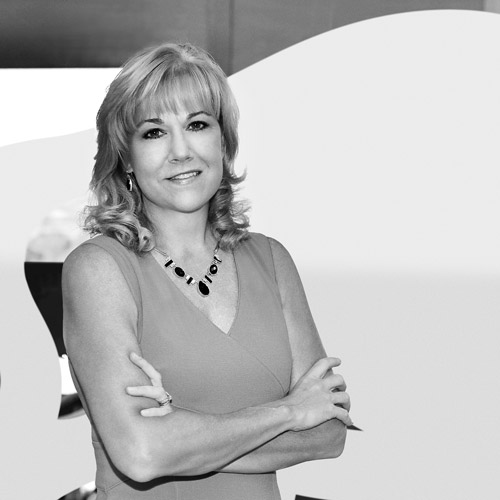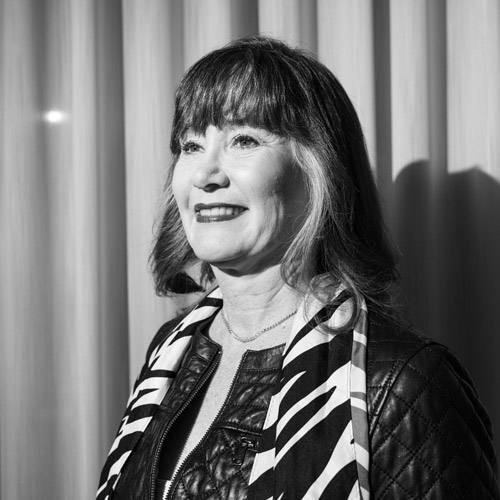Everything Agnes Di Leonardi learned in her life, however disconnected from the big picture it may have seemed at the time, eventually revealed itself as an asset in her career. The current general counsel at Mazda Canada Inc. started out in the social justice law program at the University of Windsor. “I wanted to do civil rights work and maybe become a family lawyer,” she says. “Ironically enough, the law school courses that I enjoyed the most were the corporate and commercial law courses.”
Di Leonardi’s involvement in the automotive industry spans more than twenty years, and she has touched almost every aspect of it as a lawyer: finance, mergers and acquisitions, dealer networks, marketing, and brand management. She was with Ford in Canada during the high-rolling times of the early 1990s when it purchased everything from Aston Martin and Jaguar to a driving school and metals recycling company to control more of the vehicle life cycle.
One of Ford’s acquisitions was Mazda, which was ultimately divested after the 2007-2008 financial meltdown. For Di Leonardi, this was an opening. Her contacts at Mazda knew the breadth of her legal experience and business acumen within the automotive industry, and leadership brought her on as Mazda’s first Canadian general counsel. “To me, it’s always been about continuous learning and asking, ‘What can I do next? What can I learn next?’ ” Di Leonardi asks.
This omnivorous approach to corporate law has garnered Di Leonardi a reputation as a leader in the industry. At Ford, she was heavily involved in the Canadian Vehicle Manufacturers’ Association and, at Mazda, she currently represents the company in the Global Automakers of Canada, a national industry association—comprising fifteen automotive companies operating in the country—that advocates for sound public policy to support a competitive and sustainable automotive market in Canada. Mazda is by no means the biggest of these.
“We’ve intentionally chosen to remain small, with a focus on building fewer cars of higher quality as a path to profitability,” Di Leonardi says, adding that this means asserting influence in the industry and in consumer markets, in innovative ways.
One of the biggest challenges in recent years has been responding to tightening government regulations concerning greenhouse gas emissions. While most larger automotive manufacturers are investing heavily in hybrid and electric vehicle technology, Mazda is carving out its own niche by raising the bar on fuel economy in combustion engines with its leading edge SKYACTIV technology.
In a prime example of how a general counsel must work to protect a company’s interests, Di Leonardi is working with the Global Automakers of Canada to lobby the government of Québec, which is considering legislation that would require all automotive manufacturers to offer or sell electric vehicles. While Mazda supports the mandate to reduce greenhouse gas emissions, Di Leonardi says, “Our position is you should set whatever target you want the manufacturers to meet and then let them achieve that through their own individual technology, whether that be hybrids, EVs, or more efficient combustion engines.” She points out that the infrastructure of recharging stations in Québec is currently inadequate to meet the proposed EV mandate, and there is not yet adequate consumer demand for the vehicles.
The changing face of retailing in recent years is another potential disruptor that Mazda is working to navigate, especially if it were to accelerate—as some in the industry have predicted. “It’s something that all manufacturers are thinking about,” Di Leonardi says. “It’s a question of when, not if. Technology is reshaping consumers’ buying preferences. People more and more want to buy their vehicles online. They will go to the dealership to test drive the vehicle and pick up and service the vehicle, but they really do like the online convenience.”
Rather than allow market forces to eat away at Mazda Canada’s 165 dealerships, all of which are independent businesses licensed through a sales-and-service agreement to sell Mazda products, the company is working to reignite its retail network. The focus is on customer experience and finding new ways to add value through dealerships. Mazda Canada has a partnership with the Disney Institute to develop a customer service framework geared toward creating a retail experience that connects with the consumer’s interests. “Our customer target market is car enthusiasts,” she says. “They buy a car because they love to drive, not just to get from point A to point B. Our Mazda Canada customer experience framework speaks to that by creating that exhilaration.”
Di Leonardi has a role in all of this as an executive-level steward of Mazda’s global philosophy of “Driving Matters.” The secret to the company’s success, she says, is bringing together customer experience with a great product. “We call that brand value management,” she explains.
While Di Leonardi is an expert in all legal matters related to the automotive industry, her higher expertise is in corporate leadership inside the company and in how she represents Mazda externally. And that’s where all of those diverse skills she’s picked up on her circuitous path come into play. Di Leonardi’s early interest in social justice didn’t manifest in becoming a family law lawyer, but it has led her to pursue community involvement and volunteerism in many forms over the years. From speaking at leadership conferences to fundraising for charitable organizations such as the Toronto YWCA to helping build the International Women’s Forum presence in Toronto and the rest of Canada, these experiences have fed her professional career.
For example, when she was eyeing a promotion to her first executive managerial role at Ford, she didn’t have prior experience overseeing staff. Yet, she had held a long list of leadership positions on nonprofit boards and in internal company initiatives, such as Ford’s Woman’s Advisory Council. “Leadership is about influence; it’s being able to persuade people,” Di Leonardi says. “And volunteerism is a great way to hone your leadership skills.”
The women’s council she helmed was well-respected within the company, and it led to an improvement in vehicle sales under her tenure—a fact that did not go unnoticed among company leadership. She got the job. “At times, I’ve taken opportunities that other people probably wouldn’t have thought were strategic from a career perspective,” she says. “I guess you could say my career path has been the road less traveled.”

